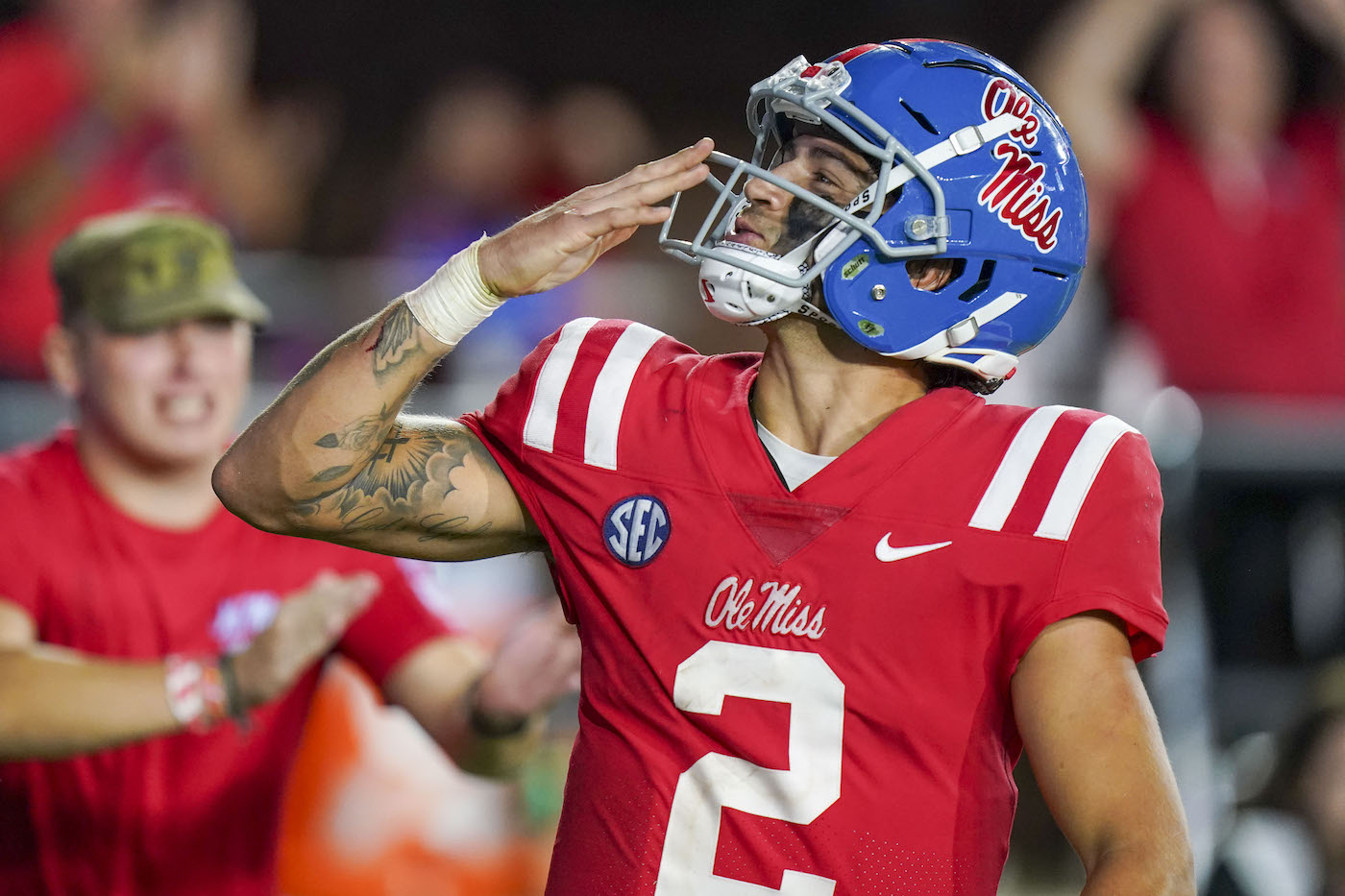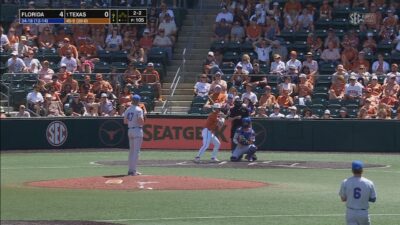Ad Disclosure

Ole Miss football: Handing out superlatives for a record-breaking regular season
By Brian Rippee
Published:
Ole Miss notched its first 10-win regular season in program history in Year 2 under Lane Kiffin. With a New Year’s 6 bowl game remaining, the Rebels will go for their first 11-win season in program history.
How did they climb so high, so fast?
The defense improved throughout the year, the offense was good when it was healthy and the Rebels made the most of having a generational arm talent at quarterback in Matt Corral. As the Rebels wait to see which bowl they will play in, let’s hand out some awards for the winningest regular season in program history.
Team MVP: QB Matt Corral
This one is obvious. Nobody in college football elevated those around him more than Corral did this season. He played through a bad ankle and did whatever the often-shorthanded Rebels needed him to do. He carried the football 30 times at Tennessee. He willed Ole Miss to a win over LSU and his re-emergence in the running game in the season-finale at Mississippi State helped the Rebels solve some red-zone woes that had plagued them in the week prior.
Corral stuck with the Ole Miss program when it didn’t always stick by him and the Rebels’ return to prominence does not happen without No. 2. He will be remembered as one of the most important quarterbacks in Ole Miss history.
Offensive MVP: WR Dontario Drummond
Like Corral, we’re going to spread it around a bit. Dontario Drummond filled what was thought to be the biggest void on the offense coming into the year. He totaled 67 catches for 924 yards and 8 touchdowns despite missing a game and a half and not being healthy for the final 4 games. When Elijah Moore departed for the NFL, the feeling was that the Rebels would have to replace his production (86 catches, 1,193 yards, 8 TDs) by committee via a veteran yet top-heavy receiving corps.
That didn’t end up happening for a variety of reasons, but Drummond did his part. Drummond totaled 41 more catches than the next closest receiver. He equaled Moore’s TD total.
He was a menace in the slot and created matchup issues over the middle and stretched defenses horizontally on jet sweeps and pre-snap motion — which also helped supplement the running game when it was struggling.
Given the injuries Ole Miss suffered at receiver and a lack of development of some of the younger players, the Rebels would’ve been far less potent without Drummond’s services.
Defensive MVP: Edge Sam Williams
This was tough decision because Jake Springer played so well, too, but Sam Williams made himself a lot of money this year. He turned himself into a consistent threat as a pass rusher and finished 2nd in the SEC in sacks behind only Alabama’s Will Anderson.
Williams gave Ole Miss a pass rush threat it hasn’t had in nearly 5 years. That proved to be vital in the second half of the season as injuries piled up on offense, which forced the defense to carry the team. Williams capped a tremendous regular season by dominating the Egg Bowl by matching his season-high with 2 sacks.
True freshman of the Year: K Caden Costa
Ole Miss didn’t have many true freshman contributors and Costa missing the final game due to an NCAA suspension makes this one slightly more complicated, but in the 11 games he did play, he was as good as any kicker in college football. He rectified an issue that plagued the 2020 team and gave Ole Miss a reliable option to salvage points when things stalled out in plus territory.
Costa made 14-of-17 field goal attempts, including some crucial kicks in a pair of close games Ole Miss won.
Transfer of the Year: LB Chance Campbell
Springer again deserves an honorable mention here, but he transferred from Navy last year and had to sit out. Campbell transferred from Maryland and didn’t arrive on campus until the summer, but man, was he crucial to this defense.
Campbell gave Ole Miss speed and instincts it hadn’t had at linebacker in some time. He was a physical run-stopping presence and did a nice job spying dual-threat quarterbacks as well as helping in blitz situations. Campbell was a huge addition for a defense that relied heavily on transfers. He needs 1 tackle in the bowl game to become the first Rebel to reach 100 in a season since DeMarquis Gates in 2017.
This one could have gone to a number of players, but Campbell’s immediate impact gave him the edge.
Most improved: S AJ Finley
Don’t mistake this for insinuating that Finley wasn’t good in his first 2 years, but he really seemed to come into his own this year on the back end of this much-improved defense. His pick-6 to seal the win over Texas A&M was his defining moment, but Finley was really good all season.
He is a smart player who is almost always in the right spot. That’s why he finished tied for 2nd on the team with 87 tackles. Without question, Finley’s improvement was a major reason this secondary took a huge step forward this year.
Biggest surprise: S Jake Springer
It was hard to gauge Springer’s talent and value until the second half of the year. He played in the season-opening win over Louisville but injured his shoulder and missed the next 4 games. It ended up being no coincidence that the defense struggled over that stretch, allowing 93 combined points to Alabama and Arkansas after getting past Tulane and Austin Peay in the first 2 games without Springer.
He brought a physical presence at the line of scrimmage and played with tremendous instincts. He instantaneously improved the team’s run defense and his return made Durkin more comfortable in being aggressive with blitzes. There isn’t a lot that sticks out about Springer from a measurables standpoint but his on-field versatility is something Ole Miss missed sorely in the 4 games without him. This defense simply looked different when Springer returned to the lineup.
Play of the Year: Finley’s pick-6 over Texas A&M
Finley’s game-sealing pick-6 was the icing on the cake in a breakout defensive performance. This defense re-established its identity and image in the second half of the year and the way they dominated A&M at the line of scrimmage and stifled its running game proved that his evolution and improvement were real.
Again, this group deserves a lot of credit. It improved every week after the Arkansas game and carried Ole Miss through the final 5 weeks of the regular season when the offense was banged up. Finley’s play is the defining one and the exclamation point on the defensive reclamation project
Win of the Year: 29-19 over Texas A&M
This was the biggest win of the year for all of the defensive reasons listed above, but it was also by far the biggest win of Lane Kiffin’s tenure in Oxford. Ole Miss hosted College GameDay that weekend and thoroughly handled one of the more physical teams in the conference.
This win helped seal Ole Miss’s spot in a New Year’s 6 bowl game and made a statement that the Rebels were more than a flashy offense.
Lane Kiffin’s second team developed into a group that could beat teams in a multitude of ways, which is a surefire sign of a program on the rise.







